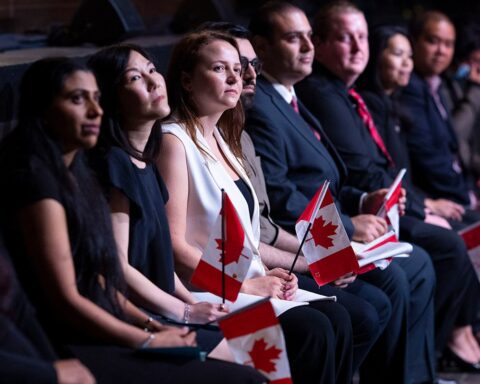With mere weeks remaining before the U.S. presidential election, which could see the victory of a candidate who has vowed to implement “extreme vetting” for immigrants, Independent Sen. Ratna Omidvar, long an advocate for diversity and inclusion, suggests that Canada is mostly, but not entirely, safe from similar issues.
“We’re a far more polite society. We have far more civility,” she said in a recent interview. “I think there are some things that Donald Trump says that nobody would say here, frankly.”
Notwithstanding that observation, Omidvar has some questions about Conservative leadership candidate Kellie Leitch’s proposed “anti-Canadian values” test for immigrants.
“Will someone tell me what is ‘Canadian’ outside rule of law and our values that are expressed in the Charter of Rights and Freedoms?” Omidvar said.
Omidvar also pointed to a recent poll by CBC News and Angus Reid, in which almost 70 per cent of respondents agreed with the statement: “Minorities should do more to fit in with mainstream American/Canadian society.”
“The CBC poll, I think, in a sense, was a reflection of language and discourse coming in (from the U.S.),” she said.
The senator sat down with iPolitics on October 6 in a vacant office at the University of Ottawa’s Fauteux Building after giving a keynote speech to a group of law students, interested in refugee law, from across Canada. The address was part of the first student-led conference of the Canadian Association of Refugee Lawyers.
Although she isn’t a lawyer, Omidvar has worked for years on issues of immigration and diversity. Prior to her Senate appointment, Omidvar chaired an organization called LifelineSyria, which helps resettle Syrian refugees in the Greater Toronto Area. She also headed up the anti-poverty Maytree Foundation for a time.
Now, the rookie senator is a distinguished visiting professor at the Global Diversity Exchange (GDX), a “think and do tank” at Ryerson University’s Ted Rogers School of Management. Omidvar is also the GDX’s founding executive director.
Recognized widely for her contributions, Omidvar has many accolades, including membership to both the Order of Ontario and the Order of Canada.
Omidvar spoke candidly for more than half an hour, sharing with the students her wisdom — such as, ‘tell human stories’ — and her experience fleeing Iran and arriving in Canada in 1981.
Following her address, the senator told iPolitics that Canadians cannot take our experience with multiculturalism for granted.
“I think we have to be aware that our story of ‘Canadian exceptionalism’ is one that continues to be strengthened,” she said.
The government’s citizenship bill
Currently, Omidvar is supporting the government’s citizenship bill, C-16, which she moved to a second reading on September 27. Now, about a year-and-a-half after the former Harper government passed its controversial Bill C-24, known as the Strengthening Citizenship Act, the new piece of legislation is intended to revert the changes the Conservative bill made to the Act.
The senator’s office outlined in a recent news release some of the “significant changes” proposed by the bill:
– Repealing the authority to revoke the citizenship of dual citizens on national interest grounds;
– Repealing the requirement for citizen applicants to declare an intent to reside in Canada;
– Reinstating previous, reduced residency requirements to obtain citizenship;
– Reinstating residency credit for temporary residents; and
– Reinstating previous age requirements to meet language and knowledge criteria to obtain citizenship.
Going forward, Omidvar says she thinks it’s going to be difficult trying to reinstate the previous age requirements, exempting those between 14 and 18 and 55 and older. Already, Omidvar is facing questions about evidence to support this change, which she says she’s trying to gather.
“I’m really concerned, here, about people who have a disadvantage in either having the capacity to learn the language or having the opportunity to learn the language,” she said.
Technically, the opportunity exists to learn an official language, given that there are classes, she said. “But when you have to work three jobs to put [food] on the table, please tell me when are you going to find time to learn English?
“I have a great deal of sympathy for immigrants who are in what I would call ‘precarious work situations,’” she said, adding that this is the case for many immigrants, especially those in cities.
Plus, Omidvar is very concerned about refugee women.
“I have a family that I’m sponsoring: I can see everyone — everyone — in the family is moving ahead by leaps and bounds. Except the mother,” she said. “Imagine if after three years, everybody else becomes a citizen and she doesn’t.”
Don’t pigeonhole her
Following her appointment last March, Omidvar told CBC News that, “There are issues that concern me that I have not been able to work on.”
Omidvar elaborated on this point while speaking to iPolitics, saying that she won’t limit her work as a senator to issues of migration, diversity and inclusion.
“I don’t want to be known as the senator [for] refugees, immigrants,” she said, adding, “It’s a big part of the country; it’s not all the country.”
Instead, “I’m pretty keen on working on issues that are of vital importance to the not-for-profit and charitable sector.”
These issues, she suggests, involve a lack of public respect for the sector, as well as its relationships with provincial/territorial and federal governments and the Canada Revenue Agency. However, Omidvar says she hasn’t yet determined her focus.
“This is an area in my eight years I would like to leave a legacy in that field, as well,” she said. “I’m interested in this because I don’t think there’s a single senator who is not associated with a not-for-profit or a charity, so this is something that we may well have common cause on.”
Senate modernization
The special committee on Senate modernization this month released its first report, with more than 20 recommendations intended to move the institution forward. The final recommendation, on committees, aims to make the process of assigning senators to standing Senate committees more inclusive in order to guarantee representation for Conservative, Liberal and independent senators.
“We should have voice and we should have standing as members of committees at the same scale of our presence in the Senate,” Omidvar said of the independent senators. “I was pleased to see some of this reflected in the Senate modernization report.”
Currently, however, this isn’t the case for the independents, who are underrepresented on committees.
“That’s simply, I think, unfair,” Omidvar said. “And that’s the first thing that has to change.”
Now, she says, there should be aggressive timelines for implementing some of these recommendations.
Life inside the chamber
Now, after roughly four months in the chamber, Omidvar says she was “naive” about parliamentary procedure and still has much to learn — which isn’t easy — in this area.
Meanwhile, she says she loves working on legislation — from the bill on Air Canada’s centres of excellence to physician-assisted dying to citizenship.
“I love the fact that at the Senate we get to see how the country really works and we are able to put our finger on it,” she said. “It’s absolutely fantastic.”
The third part, Omidvar says, involves learning how “to be more of a politician,” which is “completely new” to her.
“So, I have a very steep learning curve that I’m just beginning.”
In order to climb that curve Omidvar says she’s going to ask some of her colleagues to coach her on parliamentary procedure, an approach she thinks will be the most effective for her.
Plus, “I will keep open lines of communication with senators who oppose my point of view or support my point of view,” she said.
This goes for senators in any of the three camps — Conservative, Liberal or independent.
“I’ve been appointed as an independent and I intend to use that independence to create alliances…where I can.”
Beyond legislation
Although she introduced the government’s citizenship bill on the first day of the Senate’s fall sitting, Omidvar says she doesn’t have any plans to move another piece of legislation.
However, the rookie senator says that legislation is only one instrument — and that she’s currently trying to learn about each of the tools in her figurative toolbox. Senators can, for example, launch inquiries, ask questions and write or lead reports.
“I think it’s easy to go to legislation, but I think there’s lots one can do along with legislation.”
Published in partnership with ipolitics.ca




